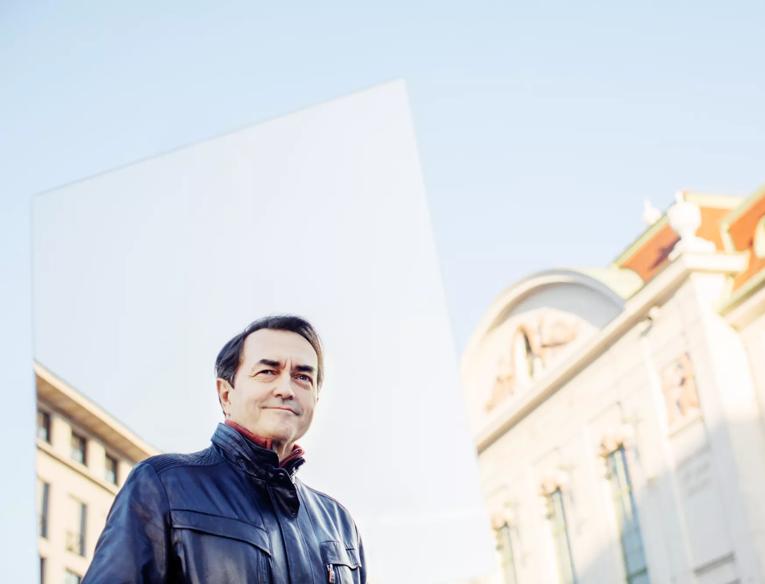Pierre-Laurent Aimard on György Ligeti

‘It sounds like nothing else,’ says pianist Pierre-Laurent Aimard of the work of György Ligeti.
If anyone is qualified to speak on the music of the Hungarian-Austrian composer, it’s Aimard. Having first begun studying Ligeti, whilst a member of Paris’ Ensemble Intercontemporain in the early 1980s, Aimard would, as the decade progressed, become a frequent collaborator with the composer. It was Aimard who, in 1987, performed the French premiere of the first book of Ligeti’s Études Pour Piano. In subsequent years this relationship grew further, with Ligeti calling on Aimard to premiere almost all of his later piano études; two of which he even dedicated to the pianist.
In October we celebrate 100 years of Ligeti with the London Sinfonietta and a day of events and performances in our Queen Elizabeth Hall, and we’re delighted to be welcoming Aimard to perform as part of the celebrations. Ahead of these events we took a moment to ask the pianist about the composer with whom his professional life has been so entwined.
What is it that drew you to György Ligeti? And what do you love most about him?
What I adore about Ligeti’s music is its incredible creativity. It sounds like nothing else. It's the music of somebody with unbelievable inner freedom and great imagination.
What is the first work of his you can remember hearing?
Atmosphères.
And what is the first of Ligeti's works that you learnt or performed?
The Chamber Concerto.
What’s your favourite Ligeti piece to perform?
Three Bagatelles, for David Tudor. The favourite work of an interpreter is hopefully the work he or she's performing at the moment. In the case of Ligeti, I find that the entire cycle of the etudes, though almost unmanageable to play, is such a challenge and a journey.
And what is your favourite Ligeti work to listen to?
Síppal, dobbal, nádi hegedűvel (With Pipes, Drums, Fiddles).

Outside of the concert hall, where and when do you find yourself most often listening to Ligeti’s music?
I’ve played a lot of Ligeti’s music, especially in this centenary year, where as many as 27, possibly even 30, of my concerts are dedicated to his music. So the first urge I have when I am not making music is not to listen to any music at all. I think when a musician finally has free time, it's a good occasion for using it for other dimensions in life.
What’s your favourite or most interesting story about Ligeti that you can share with us?
When he wrote Der Zauberlehrling, this very fast etude, I tried to play it as fast as I imagined he would like, but that was not enough and he pushed me in the tempo. Then at the concert, I thought that I had finally reached the crazy speed he wanted and when he came to take a bow on stage, I asked him if he was finally satisfied. He said, ‘Yes, you have done it’. I felt so liberated! But then he asked, ‘Could you please play it again as an encore, but this time even faster?’ This, I feel, reflected his endless sense of humour as well as his sense of challenge and risk. The stage should be a place for taking risks.
What is the best performance of a work by Ligeti that you’ve experienced?
There have been many. The Chamber Concerto with Ensemble Intercontemporain under Boulez; the Piano Concerto with Asko Ensemble under Reinbert de Leuw; Melodien by the Chamber Orchestra of Europe under Oliver Knussen; Mysteries of the Macabre with Barbara Hannigan; the Viola Sonata by Tabea Zimmermann – and many others. Ligeti always took great care of having the best possible performers, being always without compromise and having the honesty of never being influenced by ‘big’ names.
Which do you think is Ligeti’s most underrated, or most often overlooked, work?
I don’t know if there are any underrated works by Ligeti. He didn't compose that many pieces, no more than six a year, because he was so demanding with his craftsmanship. So consequently, most of his pieces are really extraordinary. Maybe there are pieces less-played because, for instance, it's not that convenient to get an orchestra, a choir and two singers.
Do you have a favourite adaptation or reinterpretation of Ligeti's music?
I always find original works the absolute very best.

